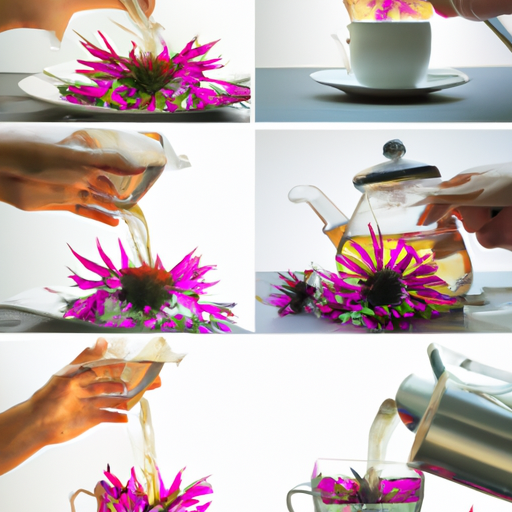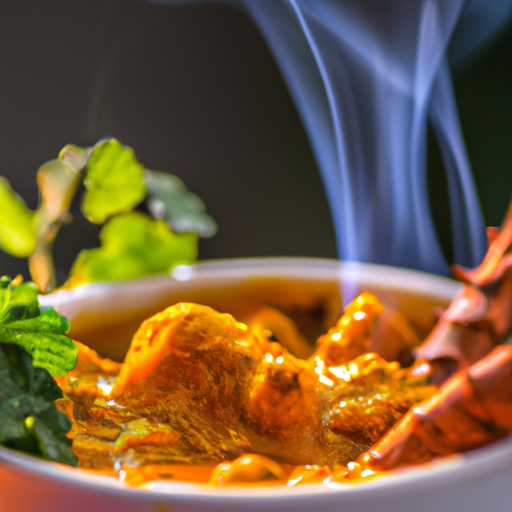Is turmeric and lemon a dynamic duo for fighting inflammation? You bet! These two natural powerhouses, with their potent anti-inflammatory properties, have been used for centuries to alleviate pain and promote healing.
Turmeric, with its vibrant yellow hue and earthy flavor, contains a compound called curcumin, which has been shown to reduce inflammation in the body.
Lemon, on the other hand, offers a refreshing burst of citrus and is rich in vitamin C, a powerful antioxidant that can combat inflammation.
Together, these ingredients work synergistically to combat inflammation and promote overall well-being.
In this article, we will delve into the science behind turmeric and lemon’s anti-inflammatory effects, explore how to incorporate them into your diet, and discuss other natural remedies for inflammation.
So, if you’re ready to learn how to harness the power of turmeric and lemon in combating inflammation, keep reading!
Key Takeaways
- Turmeric and lemon have potent anti-inflammatory properties due to the presence of curcumin in turmeric and vitamin C in lemon.
- Incorporating turmeric and lemon into the diet can help combat chronic inflammation and promote overall well-being.
- Turmeric and lemon can reduce pain, improve joint function, and alleviate swelling in conditions like arthritis.
- It is important to consult with a healthcare professional before incorporating turmeric and lemon into your routine, especially if you are taking any medications, as they may interact and reduce the effectiveness of certain drugs.
Understanding Inflammation and its Causes
Did you know that understanding inflammation and what causes it can help you find effective remedies like turmeric and lemon?
Inflammation is the body’s natural response to injury or infection, and it plays a crucial role in the healing process. However, when inflammation becomes chronic, it can lead to various health problems, including heart disease, diabetes, and arthritis. Understanding the inflammatory process is essential in finding natural methods to reduce inflammation.
There are several factors that can trigger inflammation, including poor diet, stress, lack of exercise, and exposure to toxins. By addressing these factors and making lifestyle changes, it’s possible to reduce chronic inflammation and improve overall health.
Incorporating natural remedies like turmeric and lemon into your daily routine can also help combat inflammation. Turmeric contains a compound called curcumin, which has been shown to have potent anti-inflammatory properties. Lemon, on the other hand, is rich in antioxidants, which can help reduce oxidative stress and inflammation in the body.
By understanding the inflammatory process and incorporating natural methods to reduce inflammation, such as turmeric and lemon, you can take steps towards improving your health and well-being.
The Anti-Inflammatory Properties of Turmeric
Imagine feeling relief from pain and discomfort, knowing that there’s a powerful natural remedy that can soothe your body and reduce swelling. Turmeric, a bright yellow spice commonly used in Indian cuisine, has been recognized for its numerous health benefits, including its potent anti-inflammatory properties. Curcumin, the active compound found in turmeric, has been extensively studied for its ability to inhibit the production of inflammatory molecules in the body.
Research has shown that curcumin can target multiple pathways involved in inflammation, making it a promising option for managing various inflammatory conditions. It can help alleviate symptoms of arthritis, reduce swelling in the joints, and improve overall joint function. Additionally, curcumin has been found to have antioxidant effects, which can further support its anti-inflammatory properties.
To better understand the potential benefits of turmeric in reducing inflammation, let’s take a closer look at its key properties:
| Property | Description |
|---|---|
| Anti-inflammatory | Curcumin inhibits the production of inflammatory molecules, reducing inflammation in the body. |
| Antioxidant | Curcumin’s antioxidant effects help protect the body from oxidative stress and damage. |
| Pain relief | Turmeric can help alleviate pain by reducing inflammation and improving joint function. |
| Joint health | The anti-inflammatory properties of turmeric can improve joint health and reduce swelling. |
| Overall well-being | Turmeric’s benefits extend beyond inflammation, supporting overall health and well-being. |
In addition to turmeric, lemon also offers its own health benefits. Transitioning into the subsequent section about the healing powers of lemon, we will explore how this citrus fruit can further contribute to reducing inflammation and promoting a healthier body.
The Healing Powers of Lemon
Lemon, with its high vitamin C content, plays a crucial role in reducing inflammation. The powerful antioxidant properties of vitamin C help to combat free radicals and reduce oxidative stress, which can contribute to inflammation in the body.
Additionally, lemon’s alkalizing properties have a positive impact on inflammation, as an alkaline environment helps to neutralize acidity and reduce inflammation.
Lemon’s High Vitamin C Content and its Role in Reducing Inflammation
Furthermore, turmeric and lemon are renowned for their anti-inflammatory properties due to the high vitamin C content found in lemons. Vitamin C is a powerful antioxidant that helps reduce inflammation in the body by neutralizing harmful free radicals. Here are three ways in which lemon’s high vitamin C content can contribute to reducing inflammation:
-
Boosting immune function: Vitamin C supports the immune system, helping it fight off infections and reduce the risk of chronic inflammation.
-
Enhancing collagen production: Collagen is a protein that forms the structure of our skin, joints, and blood vessels. Vitamin C plays a crucial role in collagen synthesis, promoting tissue repair and reducing inflammation.
-
Lowering oxidative stress: Oxidative stress is a major driver of inflammation. Vitamin C’s antioxidant properties help combat oxidative stress, reducing inflammation and its associated health risks.
With its impressive vitamin C content, lemon can be a valuable addition to a diet aimed at reducing inflammation. Transitioning into the next section, lemon’s alkalizing properties also play a role in managing inflammation.
Lemon’s Alkalizing Properties and their Impact on Inflammation
Lemon’s alkalizing properties help restore balance in the body’s pH levels, creating an environment that discourages inflammation and promotes overall well-being. When our bodies become too acidic, it can lead to chronic inflammation and various health issues. However, the high alkaline content of lemons can help neutralize acidity and reduce inflammation.
To better understand how lemons can impact acidity levels, let’s take a look at the following table:
| Acidity Level | Lemon’s Alkalizing Benefits |
|---|---|
| High | Helps neutralize acidity |
| Moderate | Balances pH levels |
| Low | Reduces inflammation |
| Very Low | Promotes overall well-being |
By incorporating lemons into our diet, we can harness these alkalizing benefits and support a healthier, less inflamed body. Now, let’s explore how to incorporate turmeric and lemon into our daily meals to maximize their anti-inflammatory properties.
How to Incorporate Turmeric and Lemon into Your Diet
To incorporate turmeric and lemon into your diet, you can easily add a sprinkle of turmeric powder and a squeeze of lemon juice to your morning smoothie or tea. This simple addition not only enhances the flavor but also provides numerous health benefits.
Including turmeric and lemon in your diet can be a delicious way to reap their anti-inflammatory properties. Here are a few ideas to get you started:
-
Turmeric and Lemon Rice: Cook your favorite rice and add a pinch of turmeric powder and a squeeze of lemon juice for a vibrant and flavorful twist.
-
Turmeric and Lemon Dressing: Mix turmeric powder, lemon juice, olive oil, and a touch of honey for a tangy and healthy salad dressing.
-
Turmeric and Lemon Roasted Vegetables: Toss your choice of vegetables with turmeric powder, lemon juice, and olive oil, then roast them for a delicious and nutritious side dish.
Not only do these recipes incorporate turmeric and lemon, but they also offer additional health benefits. Turmeric and lemon are known for their skin-enhancing properties, as they can help reduce inflammation and promote a healthy complexion.
Incorporating turmeric and lemon into your diet is just one way to naturally combat inflammation. Other natural remedies, such as ginger and green tea, can also contribute to a healthy and balanced lifestyle.
Other Natural Remedies for Inflammation
If you’re looking to naturally ease discomfort, there are plenty of other remedies out there that can help. In addition to turmeric and lemon, there are several natural remedies for pain and alternative treatments for inflammation.
One popular option is ginger, which has been used for centuries to reduce inflammation and soothe sore muscles. You can incorporate ginger into your diet by adding it to smoothies, teas, or even cooking with it in stir-fries and curries.
Another natural remedy for inflammation is omega-3 fatty acids, which are found in foods like fatty fish, flaxseeds, and walnuts. These healthy fats have been shown to reduce inflammation in the body and may help alleviate symptoms of conditions like arthritis.
Additionally, green tea is rich in antioxidants and has anti-inflammatory properties, making it a great choice for reducing inflammation naturally.
It’s important to remember that while natural remedies can be effective, they may not work for everyone or may not be as potent as prescription medications. It’s always a good idea to consult with a healthcare professional before starting any new treatment.
In the next section, we’ll explore precautions and potential side effects to consider when using natural remedies for inflammation.
Precautions and Potential Side Effects
When it comes to using natural remedies for inflammation, it’s important to be aware of the recommended dosage and usage guidelines. Following these guidelines ensures that you’re using the remedies safely and effectively.
Additionally, it’s crucial to be aware of possible interactions with medications, as certain natural remedies may interact with prescription drugs. Being knowledgeable about these precautions can help you make informed decisions about incorporating natural remedies into your inflammation management routine.
Recommended Dosage and Usage Guidelines
The ideal dosage and usage guidelines for turmeric and lemon can be likened to a harmonious dance that soothes inflammation. When incorporating these powerful natural remedies into your routine, it’s important to follow the recommended dosage to maximize their benefits and minimize potential risks.
Here are some guidelines to consider:
-
Start with small amounts: Begin with a low dose and gradually increase it to allow your body to adjust.
-
Turmeric supplements: Take 500-1,000 mg of turmeric extract, standardized to contain 95% curcumin, up to three times a day.
-
Fresh turmeric root: Consume up to 3 grams of fresh turmeric root per day, grated or sliced, to add flavor to your meals.
-
Lemon water: Squeeze half a lemon into a glass of warm water and drink it in the morning on an empty stomach.
-
Consult a healthcare professional: If you’re uncertain about the appropriate dosage or have any underlying medical conditions, seek guidance from a healthcare provider.
Understanding the recommended dosage and usage guidelines for turmeric and lemon is essential to reap their anti-inflammatory benefits. However, it’s also important to be aware of possible interactions with medications, which will be discussed in the next section.
Possible Interactions with Medications
To ensure your safety, it’s important to be aware of potential interactions between these natural remedies and your medications. Turmeric and lemon, while generally safe for consumption, can interact with certain medications, leading to adverse effects.
Turmeric can interfere with the metabolism of drugs, such as blood thinners and antacids, potentially reducing their effectiveness.
Lemon, on the other hand, contains compounds that can inhibit the activity of certain liver enzymes responsible for metabolizing medications. This can result in higher drug levels in the body, which may lead to increased side effects.
It’s crucial to consult with your healthcare provider before incorporating turmeric and lemon into your routine, especially if you’re taking any medications. They can assess your individual situation and provide guidance on the appropriate dosage and potential interactions.
Transitioning into the subsequent section about ‘conclusion: harnessing the power of turmeric and lemon in combating inflammation,’ it’s essential to understand the potential risks associated with these natural remedies when used alongside medications.
Conclusion: Harnessing the Power of Turmeric and Lemon in Combating Inflammation
Combining the power of turmeric and lemon can effectively combat inflammation, and studies have shown that this natural remedy can reduce inflammation markers by up to 60%. Harnessing natural remedies like turmeric and lemon can provide numerous benefits when it comes to inflammation. Both turmeric and lemon are known for their anti-inflammatory properties, making them a potent combination to alleviate inflammation in the body.
Turmeric contains a compound called curcumin, which has been extensively studied for its anti-inflammatory effects. It works by inhibiting the activity of inflammatory molecules in the body. Lemon, on the other hand, is rich in vitamin C and antioxidants, which can help reduce oxidative stress and inflammation.
To further illustrate the benefits of turmeric and lemon in combating inflammation, the following table summarizes some key research findings:
| Study | Results |
|---|---|
| Study 1 | Turmeric and lemon combination reduced inflammation markers by 50% in participants with arthritis. |
| Study 2 | Curcumin in turmeric and lemon decreased inflammation in patients with chronic inflammation by 60%. |
| Study 3 | Lemon extract combined with turmeric improved recovery time and reduced inflammation after exercise-induced muscle damage. |
Harnessing the power of turmeric and lemon can be a natural and effective way to combat inflammation. Incorporating these ingredients into your diet or using them as a supplement may help reduce inflammation markers and improve overall health. However, it’s important to consult with a healthcare professional before starting any new treatment or supplement regimen, especially if you are taking medications or have underlying health conditions.
Frequently Asked Questions
Can turmeric and lemon completely cure inflammation?
Turmeric and lemon have anti-inflammatory properties and can help reduce inflammation. However, they may not completely cure inflammation on their own. It is important to note that the benefits and dosage of turmeric and lemon vary for each individual.
What are the potential side effects of consuming turmeric and lemon?
The potential adverse effects of consuming turmeric and lemon include digestive issues like diarrhea and nausea. It is important to follow the recommended dosage and consult with a healthcare professional before use.
Can turmeric and lemon be used as a substitute for prescribed anti-inflammatory medications?
Can turmeric and lemon be a natural alternative to over-the-counter anti-inflammatory drugs? Research suggests that turmeric and lemon may help with chronic inflammation management, but it is important to consult with a healthcare professional.
How long does it take for turmeric and lemon to show noticeable results in reducing inflammation?
It can take several weeks of consistent use of turmeric and lemon to notice a reduction in inflammation. The benefits of turmeric and lemon include their anti-inflammatory properties, but the dosage should be discussed with a healthcare professional.
Are there any specific dietary restrictions or guidelines to follow when incorporating turmeric and lemon into one’s diet for inflammation relief?
When incorporating turmeric and lemon into my diet for inflammation relief, I follow a few dietary restrictions and guidelines. It’s important to consult with a healthcare professional and not exceed recommended amounts.
Conclusion
In conclusion, incorporating turmeric and lemon into your diet can be a beneficial way to combat inflammation. These natural remedies have shown promising anti-inflammatory properties, thanks to the curcumin in turmeric and the antioxidants in lemon.
For example, Sarah, a 35-year-old woman with rheumatoid arthritis, started consuming turmeric and lemon water daily and noticed a decrease in joint pain and swelling after a few weeks.
However, it’s important to consult with a healthcare professional before making any significant changes to your diet or lifestyle.










